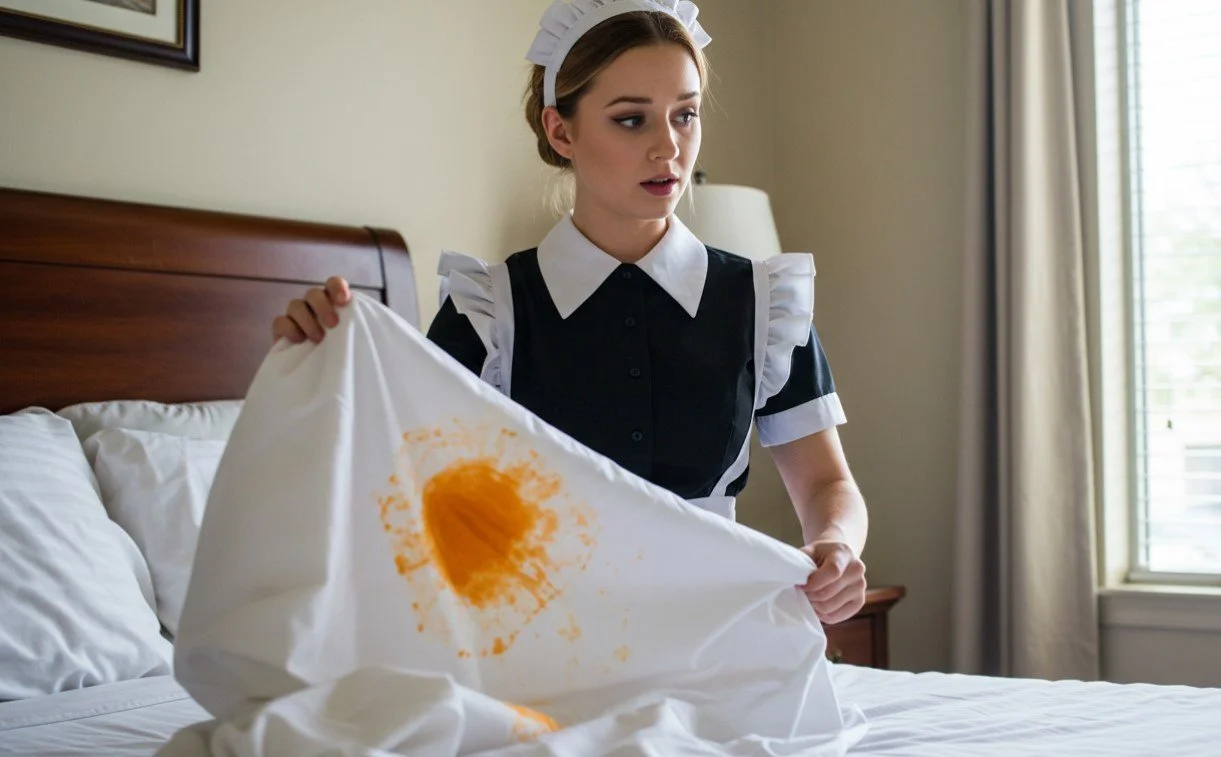Orange Stains On Bed Sheets? (Solved)
Ever woken up, looked down at your sheets, and spotted weird orange stains staring back at you? It’s not exactly the morning vibe anyone wants.
The first thought might be, what even is that?
Don’t worry - you’re not alone. Orange stains on bed sheets are way more common than people realize, and the causes are usually pretty harmless (and fixable). You don’t have to toss your sheets just yet!
In this post, we’ll shed some light on the cause of those orange stains on bed sheets and how to get rid of it.
Expert Tip: Orange spots have a life of their own—their culprits can range from sweat and skincare products to detergent reactions—and they take great joy in surviving the wash cycle. When you've finished conducting experiments, families from Minneapolis rely on our expert home cleaning expertise to bring back crisp, fresh sheets and a bed room that feels sleepy.
to enjoy fresh warm sheets and a bed room that is truly sleep-conducive.
What Causes Orange Stains On Bed Sheets?
There’s actually a handful of reasons why sheets can end up with that rusty-orange tint. Here’s what might be going on:
Sweat And Body Oils
Let’s start with the most common culprit: your own body.
When you sleep, your body sweats. Even if you’re not someone who wakes up drenched, you’re still releasing moisture and oils through your skin all night long.
Now, if you’ve got a high concentration of iron or minerals in your sweat, those can interact with your sheets (especially light-colored ones) and leave an orangey stain over time.
It’s not gross - it’s just biology.
Also, if you don’t wash your sheets regularly, those oils and sweat start to build up and cause discoloration.
Also Read: Pink Stains On Bed Sheets
Makeup Or Self-Tanner
Ever gone to bed with a little leftover makeup on your face? Or maybe you applied some self-tanner in the evening and figured it was dry enough to hit the sheets?
Both can lead to orange marks on bed sheets showing up overnight.
Self-tanners especially are notorious for transferring to fabric. Even the “non-transfer” kinds can still leave a bit of color behind.
And once that pigment sets into cotton or linen? It’s not just going to vanish with a regular wash.
Rust Or Hard Water
If your home has hard water (basically water with a lot of minerals like iron and magnesium) then that could be staining your sheets.
Here’s how it works: the iron in the water can cling to your laundry, especially on lighter fabrics, and cause orange or reddish stains. It can also build up in your washer or on anything else that comes into contact with the water, including your sheets.
It’s sneaky because you don’t always see it right away. But over time, those faint yellow-orange spots get more obvious.
Also, old pipes or rusty water heaters can add to the problem.
If you notice these stains on other laundry too, this might be your issue.
Also Read: Bar Keepers Friend Vs Comet
Food And Drink Spills
Late-night snacks in bed? No judgment - we all do it.
But foods like pasta sauce, orange soda, tea, or anything with strong coloring can absolutely leave a mark.
And if you didn’t notice it right away, that stain had plenty of time to settle in.
Even something as innocent as fruit juice can oxidize and turn orange-brown after a while. You might not even remember spilling anything, but your sheets sure do.
Bacteria Growth
Okay, this one’s kind of icky, but important.
If your sheets are damp (maybe from sweat or drool), and you haven’t washed them in a while, bacteria can start to grow. That can cause discoloration too.
Some bacteria or mildew strains produce pigments that show up as orange or reddish stains.
This is more common in humid climates or if you tend to let your sheets stay on your bed a little too long before swapping them out.
How To Remove Orange Stains From Bed Sheets
Okay, so you’ve identified the culprit. Now what?
The good news is you can tackle most orange stains with simple household stuff you probably already own. Don’t toss those sheets yet - give these methods a try first!
Step 01
The first step is always to pre-treat the stain before throwing your sheets in the wash.
Grab a little baking soda and vinegar and make a paste. Gently rub it into the stained area and let it sit for about 15 minutes. This combo works like a natural scrub and helps break down oils and pigments.
After that, rinse with cool water.
Also Read: Retro Clean Vs OxiClean
Step 02
For tougher stains (especially self-tanner or rust) hydrogen peroxide works great.
Dab a small amount directly on the stain and let it bubble for a few minutes. It’s like a mini science experiment on your sheets.
Just make sure to do a quick spot test first so you don’t accidentally bleach colored fabric.
Step 03
Once the stain has been pre-treated, wash your sheets as usual, but pay attention to the water temperature.
Hot water works best for white cotton sheets because it helps dissolve oils and disinfect the fabric. For colored or delicate sheets, stick to warm or cold water to avoid fading.
Add a little extra detergent if you want, or toss in a cup of white vinegar during the rinse cycle to keep things fresh.
Step 04
Here are a few extra tricks if the orange stain is being stubborn:
Lemon juice can help lighten rust stains.
Enzyme-based detergents are excellent for sweat and food stains.
Sunlight acts as a natural bleaching agent - air dry your sheets outside if you can.
One thing to avoid is chlorine bleach on colored sheets. It can make stains worse and weaken fabric fibers. If you’re working with white sheets, bleach is fine in moderation, but it’s not always the magic cure. Sometimes it sets the stain deeper if it’s oil-based.
The key here is patience. Some stains take a couple of rounds of pre-treatment and washing before they fully disappear.
When To Replace Your Sheets
Let’s be real - sometimes, no matter how hard you scrub, a stain just won’t budge.
If your sheets are older, the fabric fibers might be worn down, which makes stains cling more tightly. In that case, it might be time to let them go.
A good rule of thumb is to replace sheets every two to three years.
If you wash them regularly and rotate sets, they’ll last longer, but once they start looking permanently dingy, upgrading is worth it.
Plus, nothing beats the feeling of slipping into brand-new, crisp sheets.
Another sign it’s time to replace them? If you notice thinning fabric, fraying edges, or stretched-out elastic corners. Stains are one thing, but comfort and hygiene matter too.
Bottom Line
Orange stains on bed sheets usually come from everyday stuff like sweat, makeup, hard water, or the occasional midnight snack.
The good news is that most of the time, they’re totally fixable with a little pre-treatment, the right wash routine, and a bit of patience. The trick is not letting stains sit too long.
The faster you tackle them, the better your chances of saving your sheets. And if all else fails, it might just be time to treat yourself to a new set.
At the end of the day, stains happen. Life’s messy. But fresh, clean sheets are always just a wash (or a shopping trip) away.

